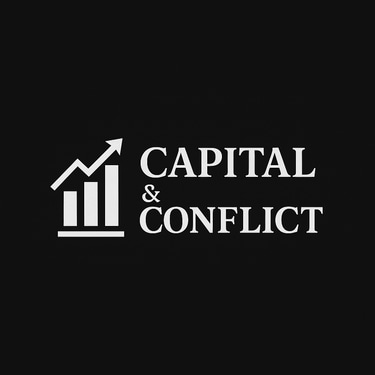The Congo Conflict: Why the World’s Economy Depends on Peace
MACROECONOMIC
Kirsten Mhlanga
9/26/20253 min read


In the Democratic Republic of the Congo, a fragile peace deal between the Government (FARDC) and the March 23 Movement (M23) in 2013 has seemed to be unravelling. Accusations of broken promises and failure to disarm allowed the M23 to regroup in exile and draw new fighters from Uganda and Rwanda. By 2022, a new resurgence commenced
What began as localised clashes has since escalated into one of Africa’s most dangerous conflicts. In January 2025, the war escalated and grabbed headlines globally as M23, unlike before, gained more territory and captured the main economic hub of eastern Congo, Goma and later Bukrva, as well as displacing millions of people from their homes. Despite a ceasefire deal being agreed between the two sides in June 2025, fighting has not fully stopped. Amidst the mist of this conflict, huge questions are now being asked: What are the economic ramifications of this war on the region and globally?
M23’s stated plan is that they demand rights, security, and political recognition for their fighters and communities. But their actions of seizing major cities, tacking over mines and displacing millions — suggest other aims, which are to entrench themselves as a permanent power in eastern Congo. The war between the (FARDC) and (M23) is not the only reason why there is immense instability in the country. Other proxy groups such as FDLR (Democratic Forces for the Liberation of Rwanda), CODECO (Cooperative for the Development of the Congo) and Allied Democratic Forces (ADF) are all having their say in the country. With the FDLR, CODECO all involved in seizing and smuggling natural resources and mines from the Congo, while the ADF is an ISIS-backed group conducting bombings and attacks across Eastern Congo.
The Democratic Republic of the Congo (DRC) is a country of contradiction: it possesses mineral wealth but remains one of the poorest nations in the world. The country's economy is largely built on mining, accounting for 95% of exports and generating royalties, taxes, and export duties from mining companies that contribute significantly to its overall budget. Due to the war, especially the displacement of 8 million Congolese people (who contribute to the mining) and the hijacking of mines by proxy groups, the mining industry is being heavily affected, causing government revenue to collapse. Likewise, with the agriculture and hydropower industries, despite being smaller sectors of the Congo’s economy, the goods of Coffee, Cacao, Palm Oil and hydroelectricity are still sought-after goods. The trajectory of trade and exportation all depends on whether the June 2025 ceasefire leads to genuine stability or further relapse into conflict.
On an international scale, huge forces on the global scale, such as the EU, the United States and China, and companies from these countries also see and rely on the Democratic Congo. Due to the copper and Cobalt they possess, nations such as can develop them into electronics such as electric cars, mobile phones and renewable Energy. It is clear to say that for Western nations and China, the DRC is integral to global supply chains as well as the development of renewable energy. The war has made trading difficult for them as they must contend with the political tensions between the government and M23 and the persistent threat of armed groups.
In terms of recovery, to some extent can be aided by international support. Countries in proximity (such as Uganda and Rwanda), Chinese investment, and Western-led critical mineral initiatives can play a decisive role in shaping its economic future. Steps like this have already been taken by the US as they have sanctioned some of the proxy groups who “deny them access to the critical minerals vital for our national defence.
Ultimately, despite the Congo being almost used to conflict and war. Having experienced several wars dating back to 1960 when gaining independence from Belgium, the current conflict has one of the worst social and economic effects to date. Millions of citizens, not just in the Congo but globally, are paying the cost and consequences of a war that affects global industries. The future and economic trajectory of DRC not only depends on long-lasting ceasefires but reforms and credible investment in peace. Without that, the country’s immense potential will remain a story of wealth without prosperity.
Insights
Exploring political risk and financial market impacts. This is not financial advice.
Analysis
Trends
© 2025. All rights reserved.
